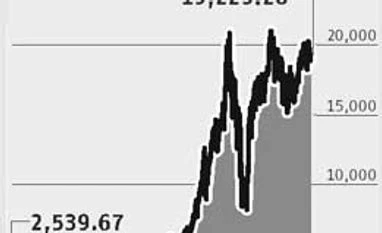Battered Indian stocks will bounce back in the second half of 2013, according to a Reuters poll of leading equity strategists who cited hopes of economic recovery and further fiscal reforms.
Despite share prices taking a beating in recent weeks, the median of 22 strategists polled from June 11-17 predicted the benchmark BSE Sensex would gain almost nine per cent from yesterday's close of 19,325.87 points, reaching 21,000 by the end of the year.
It is then expected to gain a further five per cent to a new high of 22,000 by next June, beating a previous record of 21,206.77 reached in January 2008.
In a March poll, strategists had expected the BSE to end this month at 20,500, a level almost reached when the index hit a two-and-half-year peak of 20,443.62 on May 20.
Although the Reserve Bank of India left yesterday policy rates unchanged, it has helped improve economic confidence after cutting interest rates by 75 basis points (bps) this year and a total of 125 bps since April 2012.
"We believe India's macro fundamentals are well poised to improve, on the back of the rate easing cycle and policy reforms," said Deven Choksey, managing director of K R Choksey.
Analysts remain optimistic, even after the rupee slumped to record lows this month on concerns that foreign investors would sell Indian investments, should the US Federal Reserve roll back its stimulus measures.
Since US Federal Reserve Chairman Ben Bernanke hinted last month at trimming a massive bond-buying programme, the index has fallen almost four per cent. Still, none of the 19 strategists surveyed expect any impact to foreign institutional investor (FII) inflows.
"I don't know why there is uncertainty about it because the Fed cannot monetise things for the next 100 years," said Phani Sekhar, fund manager at Angel Broking.
Finance Minister Palaniappan Chidambaram this month promised more fiscal and economic reforms, including opening more sectors to foreign investment and revising power rates and locally produced gas prices.
Those measures could prop the rupee and help narrow a current account deficit that hit a record high of 6.7 per cent of gross domestic product in the October-December quarter.
A slew of reforms since September 2012 led Fitch Ratings to raise the country's sovereign outlook back to "stable" from "negative" last week.
However, some analysts worry the government will struggle to pass fiscal and economic reforms in light of a gridlocked parliament, although 14 of 19 strategists do not expect India's ruling coalition to call for early elections.
Despite share prices taking a beating in recent weeks, the median of 22 strategists polled from June 11-17 predicted the benchmark BSE Sensex would gain almost nine per cent from yesterday's close of 19,325.87 points, reaching 21,000 by the end of the year.
It is then expected to gain a further five per cent to a new high of 22,000 by next June, beating a previous record of 21,206.77 reached in January 2008.
In a March poll, strategists had expected the BSE to end this month at 20,500, a level almost reached when the index hit a two-and-half-year peak of 20,443.62 on May 20.
Although the Reserve Bank of India left yesterday policy rates unchanged, it has helped improve economic confidence after cutting interest rates by 75 basis points (bps) this year and a total of 125 bps since April 2012.
"We believe India's macro fundamentals are well poised to improve, on the back of the rate easing cycle and policy reforms," said Deven Choksey, managing director of K R Choksey.
Analysts remain optimistic, even after the rupee slumped to record lows this month on concerns that foreign investors would sell Indian investments, should the US Federal Reserve roll back its stimulus measures.
Since US Federal Reserve Chairman Ben Bernanke hinted last month at trimming a massive bond-buying programme, the index has fallen almost four per cent. Still, none of the 19 strategists surveyed expect any impact to foreign institutional investor (FII) inflows.
"I don't know why there is uncertainty about it because the Fed cannot monetise things for the next 100 years," said Phani Sekhar, fund manager at Angel Broking.
Finance Minister Palaniappan Chidambaram this month promised more fiscal and economic reforms, including opening more sectors to foreign investment and revising power rates and locally produced gas prices.
Those measures could prop the rupee and help narrow a current account deficit that hit a record high of 6.7 per cent of gross domestic product in the October-December quarter.
A slew of reforms since September 2012 led Fitch Ratings to raise the country's sovereign outlook back to "stable" from "negative" last week.
However, some analysts worry the government will struggle to pass fiscal and economic reforms in light of a gridlocked parliament, although 14 of 19 strategists do not expect India's ruling coalition to call for early elections.
)